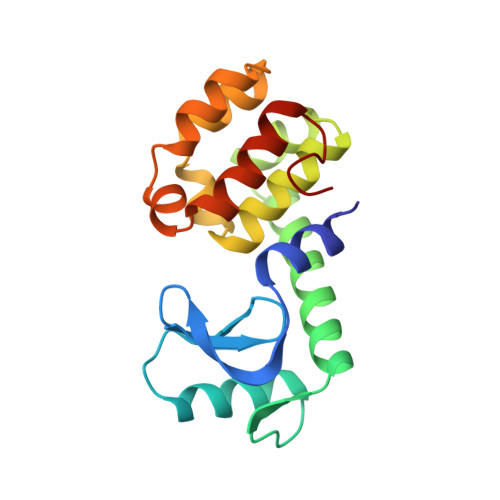Design and structural analysis of alternative hydrophobic core packing arrangements in bacteriophage T4 lysozyme.
Hurley, J.H., Baase, W.A., Matthews, B.W.(1992) J Mol Biol 224: 1143-1159
- PubMed: 1569571
- DOI: https://doi.org/10.1016/0022-2836(92)90475-y
- Primary Citation of Related Structures:
1L77, 1L79, 1L80, 1L81, 1L82, 2L78 - PubMed Abstract:
An attempt has been made to design modified core-packing arrangements in bacteriophage T4 lysozyme. Alternative replacements of the buried residues Leu99, Met102, Val111 and Phe153 were selected using packing calculations and energy minimization. To test the design procedure, a series of multiple mutants was constructed culminating in the replacement L99F/M102L/V111I/F153L. These variants decrease the stability of T4 lysozyme by approximately 0 to 2 kcal/mol. The crystal structures of a number of the variants were determined. In the variant in which Val111 was replaced by Ile, alpha-helix 107-114 moved by approximately 1.5 A, breaking the hydrogen bond between the backbone carbonyl group of Thr109 and the backbone amide group of Gly113. This conformational change was not anticipated by the design procedure. Compensating interactions of magnitude up to 1.1 kcal/mol occur for some sets of mutations, while other sets display nearly additive stability changes. Within experimental error, the stability of the double mutant V111F/F153L is additive, with delta delta G different by only 0.1 kcal/mol from the sum of the two single mutants. The quadruple mutant L99F/M102L/V111I/F153L is destabilized by 0.5 kcal/mol, compared to delta delta G = -1.6 kcal/mol for the sum of the four single mutants. Multiple mutants show smaller overall structural changes from wild-type than M102L or V111I alone. Co-operative changes in structure and stability can be rationalized in terms of specific structural differences between single and multiple mutants. Genuine repacking of the hydrophobic core of T4 lysozyme with minimal effects on structure, stability and activity thus appears to have been achieved.
Organizational Affiliation:
Institute of Molecular Biology, Howard Hughes Medical Institute, Eugene, OR 97403.
















